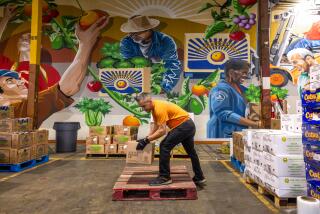A Year of Record U.S. Giving, but Local Charities Fall Short
- Share via
SEATTLE — They start lining up just as the sun begins to set in Pioneer Square, homeless men and women from all parts of the city, eager for their big meal of the day. One by one they walk through the doors of the old red-brick building into a dining hall, where plates of steaming hot food await.
It’s the same scene night after night at the Union Gospel Mission, which serves as many as 600 people at dinnertime. The food lines are longer than ever, even as donations to the mission are lower than ever.
The mission is one of numerous Seattle-area charities reporting severe shortages during this year of record-high giving by Americans. Donations that would have gone to local groups, officials say, instead went to help victims of the Gulf Coast hurricanes, the earthquake in Pakistan and the Indian Ocean tsunami.
“We know what happened in the gulf. There was tremendous need there,” said Craig Carpenter, the mission’s director of development. “By the same token, there’s tremendous need here too. We’re trying to meet that need and we’re struggling.”
The mission is nearly $300,000 in the red, the equivalent of more than 140,000 meals. At the same time, the charity has recorded a 13% increase in the demand for meals over last year.
The organization serves an average of 1,200 meals a day, 365 days a year, and also operates a shelter that houses as many as 250 homeless people per night.
Carpenter said the shortfall will start to be felt at the beginning of the new year, and it could mean a smaller paid staff, an under-maintained facility and possibly even a change in the quality of the food served. “Instead of chicken or beef for dinner,” he said, “it could be soup and mashed potatoes.
“The last thing we want to do is cut our services.”
The Northwest Salvation Army, which diverted a large percentage of its budget this year to help Hurricane Katrina victims, now is about $200,000 in the hole, said Scott Sciuchetti, the agency’s donor-relations director.
“All the local charities are suffering,” Sciuchetti said. “We would never want to discourage people from giving. I think it’s great that people were so generous this year. I just wish the local charities were not left out.”
The budget shortfall means that 1,300 low-income residents will not receive Salvation Army subsidies to pay for gas and electricity bills, Sciuchetti said. It could also mean that 2,500 families will not receive a week’s worth of donated food from the agency.
Seattle-based Northwest Harvest, a hunger-relief agency, recorded a 22% drop in cash donations and a worse drop in food donations. Officials said the agency’s warehouse is only three-fourths full. A year ago it was completely full.
At the same time, Northwest Harvest, which supplies food to 300 hunger-relief programs throughout Washington, has experienced a surge in the number of families served per month, from 1,600 in November 2004 to 1,900 this November.
The local shortages come at a time of record-setting national compassion.
U.S. charity officials report that private donations for victims of the earthquake in Pakistan exceeded $50 million; donations for tsunami victims topped $1.6 billion; and Hurricane Katrina drew nearly $3 billion in private gifts.
Stacy Palmer, editor of the Chronicle of Philanthropy, described this year’s giving as “phenomenal.”
Northwest relief organizations whose focus is on national and international aid contributed mightily to disaster relief this year. Mercy Corps, based in Portland, Ore., raised about $60 million in 2005, equivalent to the amount of donations received by the agency over the previous 10 years combined.
World Vision, a faith-based organization headquartered south of Seattle, also had a record year, raising more than $10 million for Hurricane Katrina relief.
“The issue isn’t donor fatigue, but donor distraction,” said Amy Parodi, spokeswoman for World Vision. “The challenge is keeping people focused on the emergencies that are affecting the most people in the worst ways.”
For Carpenter of the Union Gospel Mission, the focus is the ongoing emergency of housing and feeding people who live on Seattle’s streets.
Every day, he sees the ragged lines of people waiting to get into the mission’s shelters and dining hall.
With the coldest part of winter ahead, he wonders what part of the mission’s fragile network will suffer from the local shortages. He also muses on the irony of those long lines in a year of such public generosity.
“So many people gave,” Carpenter said, “and yet I look out there and see that the need just never seems to lessen.”
More to Read
Sign up for Essential California
The most important California stories and recommendations in your inbox every morning.
You may occasionally receive promotional content from the Los Angeles Times.










